 |
Do I really need to have that work done?
We will never tell you that it needs to be done unless it really does. We will make recommendations about work that we would advise be done. If you get it done now or later, by us or someone else is entirely up to you. |
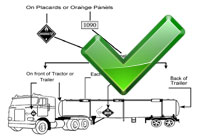 |
Do all of your repairs meet DOT specifications?
We pride ourselves in doing the job right not only for you, but for our name as well. All of our repair work meets DOT and Federal requirements. We want you safe and satisfied. We would like to see you again. |
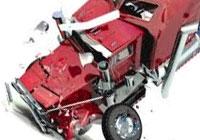 |
Do you only perform basic maintenance or can you handle major repairs also?
We handle all of your repair needs. Whether it be something as simple as a light that needs replaced or a transmission, we can do it. Sometimes it may also be cheaper and easier to just repair it instead of a full replacement. That choice is yours. |
 |
How do you compare to the big companies on price, quality, and warranty?
Our prices not only compare, but most of the time they beat the big companies. Quality is the best in the business and we back up all of our work 100%. |
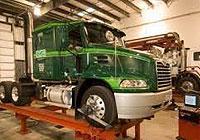 |
Why should I perform maintenance?
It saves you money and prevents inconvenient repairs. Simply stated, maintenance costs are less than repairs. Properly maintained truck or trailer that has had investments made in maintaining the fluids, filters, etc. will last longer, have fewer breakdowns and realize a lower overall cost per mile. It can be very frustrating sitting on the side of the road waiting for a tow truck knowing that the cause could have been prevented by performing preventive maintenance. |
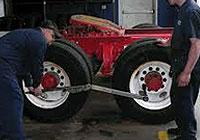 |
How often should I rotate tires on my truck?
Your truck tires should be rotated every other oil change, or every 6000 miles. Neglecting to rotate truck tires is a major cause of premature truck tire wear. |
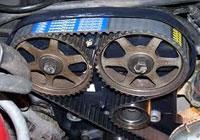 |
Is it really necessary to replace my timing belt at the recommended interval?
YES. The failure of a timing belt in many commercial trucks can result in diesel engine damage. The cost of repairing a diesel engine with a broken timing belt is much greater than the cost of a timing belt replacement. |
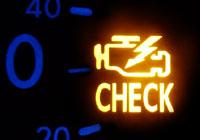 |
What does it mean if my "CHECK ENGINE" light comes on in my truck?
There are many sensors and computerized components that manage your commercial vehicle's diesel engine performance and emissions. When one of these fails, the "check engine" light is illuminated. |
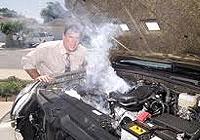 |
What should I do if my truck starts to overheat?
This is a very serious problem - if your truck overheats for too long, you can damage your diesel engine. As soon as possible, find a safe place to pull off the road and shut the diesel engine off! Do not attempt to check the fluid level in the radiator; the hot fluid can cause severe burns. The best thing to do is have your truck towed to the nearest, trusted truck repair facility. |
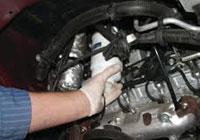 |
When should I replace my commercial vehicle's fuel filter?
To help ensure dependable, trouble-free performance, replace your truck's fuel filter approximately every 3,000 miles or as recommended in your commercial vehicle's owner's manual. |
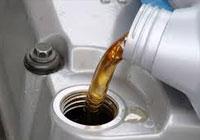 |
Should I consider using synthetic motor oil in my truck?
Synthetic motor oils can be a good choice for heavy duty diesel engines, or for vehicles that are used for towing (especially during hot weather), and commercial vehicles that operate in extremely cold or hot climates. Although more expensive than mineral-based oils, synthetic motor oils can improve fuel economy and provide longer intervals between preventative maintence service. |
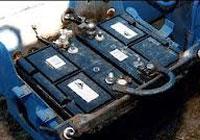 |
How do I make sure my truck batteries have a good electrical connection?
Battery cables and terminals should be cleaned and inspected periodically to make sure they provide a good electrical connection. |
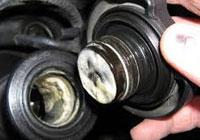 |
Why is engine oil milky brown?
Milky brown engine oil is an indication of coolant in the oil. This can be caused by a blown head gasket, a failed transmission cooler, or cracked casings. This condition is very serious and needs to be checked by a professional diesel technician immediately. |
 |
I need to replace a burned out fuse, what should I do?
Always replace burned-out fuses with ones of the same amperage (printed on the fuse) and note that if a fuse continues to "blow," you should have the truck checked professionally by one our diesel truck electrician. |

















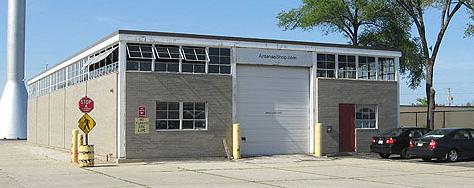
 5300 St.Charles Road, Unit B, Berkley, IL 60163
5300 St.Charles Road, Unit B, Berkley, IL 60163
 (630) 216-5557
(630) 216-5557